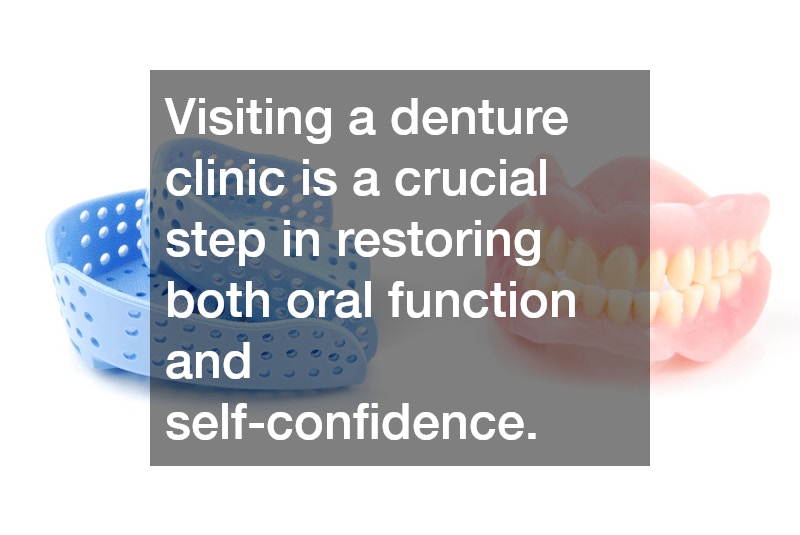Whether you are considering dentures for the first time or looking to replace your existing set, knowing what to expect from a denture clinic visit is crucial for a successful outcome. Dentures can significantly improve quality of life by restoring function, appearance and confidence.
However, the experience largely depends on preparation, communication and understanding the process. A proactive approach to your visit ensures you receive the best possible care and tailored recommendations for your dental health. Below are five essential tips to help you navigate your appointment with confidence and clarity.
Understand Your Needs Before the Appointment
Before walking into a denture clinic, it helps to have a clear understanding of why you are seeking dentures and what outcome you hope to achieve. Whether you’ve lost teeth due to ageing, gum disease, or trauma, understanding your unique circumstances can help your denture specialist tailor solutions specific to your needs. Spend some time reflecting on your oral health history and jot down any concerns or symptoms you’ve noticed, such as difficulty chewing, speech issues, or jaw discomfort. These details may seem minor but can significantly influence the type of denture recommended.
Being honest about your lifestyle is also beneficial. For instance, if you play wind instruments or have dietary preferences requiring durable chewing function, your prosthodontist will need to factor this into the denture design. Arriving informed and prepared sets a strong foundation for a productive consultation.
Bring Your Dental Records & Relevant Medical Information
When visiting a denture clinic, providing your dental and medical history is vital for comprehensive care. If you’ve been treated by another dentist or had past dental procedures such as extractions, implants, or root canals, bring along any relevant records or x-rays. These can offer your denture specialist insight into your oral anatomy, bone density, and overall dental health, all of which play a role in designing and fitting dentures correctly.
Also, be sure to share any medical conditions or medications you’re currently managing. Conditions like diabetes, osteoporosis, or autoimmune diseases may affect healing and gum sensitivity, influencing how your dentures are made and maintained. Accurate information ensures your denture provider considers any potential risks or adjustments needed to optimise treatment.
Ask Questions & Discuss All Available Options
A denture clinic should never feel like a one-size-fits-all service. During your consultation, it’s important to ask detailed questions to understand the full scope of treatment options. Dentures come in various forms – full, partial, removable, or implant-supported – and each has its advantages and limitations. Ask your specialist to explain the differences, costs, durability, and maintenance requirements of each type.
Inquire about materials used, the denture fabrication timeline, and follow-up care protocols. Discuss whether digital scans or traditional impressions will be used, and what to expect during the fitting and adjustment phases. Open dialogue not only informs your decision-making but also builds trust with your provider, ensuring that your personal preferences and goals are respected throughout the process.
Prepare for an Adjustment Period
It’s important to understand that adapting to new dentures takes time and patience. During your visit to a denture clinic, your specialist will likely explain the physical and emotional adjustment process. It’s common to experience changes in speech, minor gum irritation, or difficulties with chewing during the first few weeks. However, these symptoms typically subside as your mouth adjusts to the new appliance.
Follow any care instructions given to you, such as wearing the dentures for specific periods, avoiding certain foods, or using dental adhesives if recommended. Keep communication open with your denture provider, especially if you experience persistent discomfort or functional issues. Your initial fitting may require a few follow-up appointments for adjustments to ensure comfort and proper alignment. By managing your expectations and remaining proactive during this transition phase, you increase the likelihood of a successful and satisfying result.
Commit to Regular Maintenance & Check-Ups
A visit to the denture clinic doesn’t end once your dentures are fitted. Ongoing maintenance is essential for long-term success. Just like natural teeth, dentures require regular cleaning and professional oversight to ensure they remain functional and hygienic. Over time, your mouth may change shape due to natural bone resorption, potentially leading to poor fit or discomfort. Scheduling periodic check-ups helps detect such changes early and allows for timely relining, repairs, or replacements.
Your specialist can also screen for any signs of oral infections, pressure sores, or changes in gum health. Proper hygiene practices at home – including brushing the dentures, soaking them overnight, and cleaning your gums – are equally important. If you notice signs of wear, difficulty chewing, or looseness, contact your denture provider promptly. Treating your dentures with care and following up consistently ensures they last longer and continue to perform optimally.
Make the Most of Your Visit
Visiting a denture clinic is a crucial step in restoring both oral function and self-confidence. With the right preparation, a clear understanding of your goals, and open communication with your specialist, the process can be smooth and empowering. Remember to gather relevant records, ask comprehensive questions, and follow up diligently for adjustments and maintenance. By taking an active role in your care, you ensure that your experience with dentures is both positive and transformative. A reputable denture clinic is more than just a place to receive artificial teeth – it’s a partner in your journey to renewed oral health and comfort.

